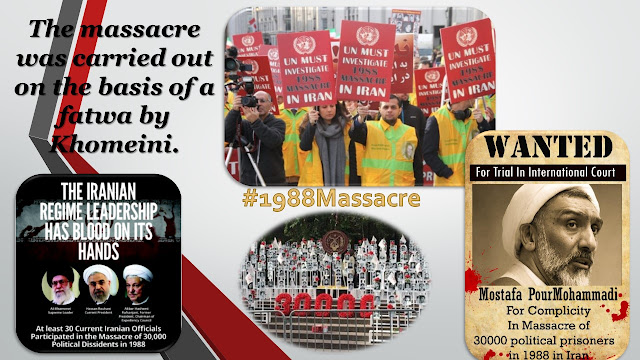By Hassan Mahmoudi
In the summer of 1988, 30,000 Iranian political
prisoners, supporters of the People’s Mujahedin of
Iran, were massacred. As the 30th-anniversary approaches, the families of
the victims and the citizens of Iran still await justice and an international
tribune.
Thousands
of Iranian political prisoners were systematically executed during a
state-sponsored, five month-long killing spree in 1988. The prisoners,
some as young as 14 years old, were killed in groups—loaded onto trucks and
hanged from cranes. Over the past three decades, the regime has blocked all
attempts at investigating the extent of the massacre. They have gone to
great lengths to conceal the truth about the murders, including damaging cemeteries with
bulldozers and toppling the headstones that mark the martyrs’ graves
There
is neither a single government institution nor criminal justice system to deter crime
and enforce a penal code in Iran. The Supreme Leader, Ali Khamenei,
controls everything. He sets the tone and direction of Iran’s domestic
and foreign policies and has allowed many former members of the “Death
Commission” to remain in power. Figures like Mostafa Pour-Mohammadi and
cleric Ebrahim Raisi are heavily involved in contemporary Iranian
politics. The former is presently the minister of justice under President
Hassan Rouhani’s Administration and the latter was the Supreme Leader’s in the
2017 presidential election—both have defended the government’s actionsstarting on July 19, 1988.
“[A]
dictatorship that appoints as its justice
minister someone who killed 30,000 people is telling you everything you need to
know about the core nature of the dictatorship,” said Newt Gingrich,
50th Speaker of the United States House of Representatives, at the Free Iran
Rally in Paris on July 1, 2017. “[D]ictatorships like the one in Iran
threaten freedom anywhere,” according to Gingrich, who called Iran the largest
supporter of state terrorism in the world.
The
massacre was ordered by a Khomeini decree, called a fatwa, that reads:
“[P]olitical prisoners throughout the country who remain steadfast in their
backing for the Mojahedin (MEK)
are condemned to execution.”
Despite
the preservation of policies that rely on crackdowns, tortures, and executions
over the past three decades, , the regime has failed. “You will someday be
proud to say you were a part of what freed Iran,” Gingrich said.
“I want to salute you today
for your courage and for your perseverance of the MEK and the NCRI,” Said Linda
Chavez,
Chairman of the Center for Equal Opportunity and former director of the Office
of Public Liaison, at the Paris gathering. “You are the ones who remain
committed to freedom and to democracy for Iran and to eradicate the
suppression, the terrorism, and the regime’s demonizing campaign that has been
directed at you. Your perseverance gives us
hope that we shall, in the end, defeat the phenomenon of Islamic
fundamentalism, whose heart beats in the clerical regime in Iran. I wish
you a good meeting, and I wish that your message will be carried throughout the
world.”
“They
have on their hands the blood of so many of your
people,” said former New York mayor Rudolph Giuliani,
“but they have on their hands the blood of my people, too, who they helped to
kill in Iraq and who they’ve helped to kill for years and who they’ve held
hostage.” Giuliani is an advocate for classifying the Revolutionary Guards as a
terrorist organization. He continues: “If they’re not a terrorist
organization, there is no such thing as a terrorist organization. And we
should declare them a terrorist organization so we can cut them off of support
around the world.”
Despite
the dark legacy of Iran’s dictatorships, the “light
of liberty can overcome and replace the darkness
of the tyrannical Iranian regime,” remarked Tom
Ridge, the former United States Secretary of Homeland
Security, at the rally. “The light of freedom is kept going by all those who
have lost their lives for the cause.”
Greek philosopher
Xenophon wrote: “The true test of a leader is
whether its followers will adhere to his cause from their own volition,
enduring the most arduous hardships without being forced to do so, and
remaining steadfast in the moments of greatest peril.”
The views and opinions
expressed in this article are those of the author and do not represent any
institution or entity.



Comments
Post a Comment